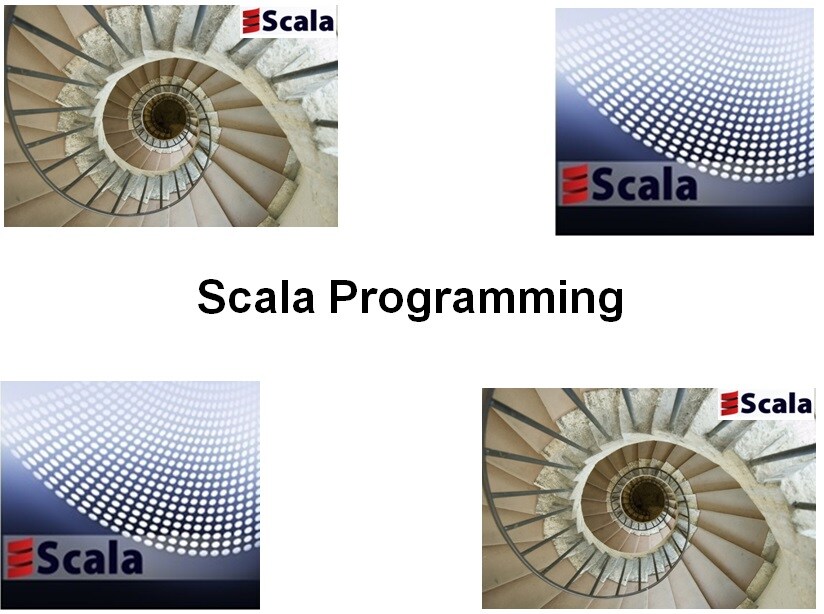-
Learning by doing
-
Trainers with practical experience
-
Classroom training
-
Detailed course material
-
Clear content description
-
Tailormade content possible
-
Training that proceeds
-
Small groups
In the course Scala Programming the syntax and capabilities of the Scala programming language are discussed. Scala combines the power of object-oriented and functional programming and makes it possible to deliver functionality comparable to Java or C# with considerably less code.
The Scala Programming course starts with a discussion of the concepts and characteristics of the Scala language compared to Java. Like Java, Scala produces code that is loaded into the Virtual Machine.
Next attention is paid to the syntax, the data types, variables, control structures and packages of Scala, as well as the possibilities to extend Scala and the use of Scala Frameworks such as the Lift Web Framework and the Play Framework.
Special attention is paid to the functional aspects of Scala such as first-class functions, higher order functions and the different ways of parameter transfer in Scala. Other typical language elements of Scala are also discussed, such as closures and deferred execution.
Subsequently data structures and collection types in Scala such as lists, maps, tuples and their respective higher order functions are covered.
Also the object oriented aspects of Scala such as inheritance, constructors, companion objects and overriding are treated. This includes support for duck typing. The concept of Scala Traits and the use of mixins is also discussed extensively.
A separate module is dedicated to pattern matching in Scala. This includes Match expressions, Match with variables and Match with Sequences. Wildcards are also covered and it is explained how to deal with any.
Finally attention is paid to concurrency in Scala with the Akka Framework and using Actors and Mailboxes and asynchronous communication.
The course Scala Programming is intended for Java, C# and other developers who want to learn programming in Scala or who want to explore the possibilities of Scala.
To participate in this course knowledge and experience with an object oriented programming language such as Java or C# is required.
The theory is discussed on the basis of presentation slides. Demos are used to clarify the concepts. The theory is interspersed with exercises. The course material is in English and a modern IDE is used.
Participants receive an official certificate Scala Programming after successful completion of the course.

Module 1 : Scala Intro |
Module 2 : Language Syntax |
Module 3 : Functions and Closures |
| Introducing Scala Basic Syntax Scala Concepts Semicolons Scala Keywords Scala Characteristics Comments in Scala Interactive Shell Compiling Scala Scala HelloWorld Variables and Constants Java versus Scala Scala versus Java Scala Resources |
Variables and Scopes Scala Data Types Scala Type Hierarchy If and Else Statements Multiple Selection For and While Loops For Yield Filtering Breakable Blocks Formatted Strings Scala Arrays Multidimensional Arrays Ranges Scala Operators Reserved Symbols |
Scala Functions Call by Value and by Name Named Parameters Variable Arguments Default Parameters Recursive Functions Nested Functions Methods versus Functions Anonymous Functions First Class Functions Higher Order Functions Partially Applied Functions Currying Functions Simple Closure |
Module 4 : Data Structures |
Module 5 : Classes and Traits |
Module 6 : Pattern Matching |
|
Scala Collection Hierarchy Scala Lists Nills and Cons Head and Tail List Concatenation Scala Sets Concatenation Min and Max Intersections and Unions Scala Maps Keys and Values Scala Tuples Scala Options GetOrElse |
Scala Object Orientation Scala Classes Preventing State Change Object Singleton Constructors Companion Objects Inheritance Abstract Classes Traits Partial Trait Implementation Abstract Members Mixins Implicit Classes |
Unit returning Expressions Dealing with Any Match Expression Example Match Expressions Matching using case Classes Match with Variables Match with Sequences Extended Wildcard _* Scala versus Java Pattern Matching in Assignments Match with Types Matching on Tuples Pattern Matching with Option |
Module 7 : Scala Concurrency |
||
| Concurrent Programming Akka Framework Actors in Akka Hello Akka World ActorSystem Actor Hierarchy Actor Information Supervision Supervision Strategies Top Level Supervisors OneForOneStrategy Location Transparency Akka Guidelines |
